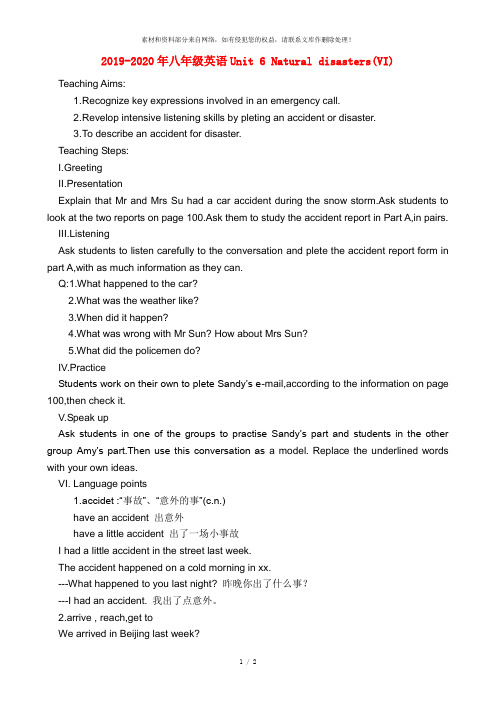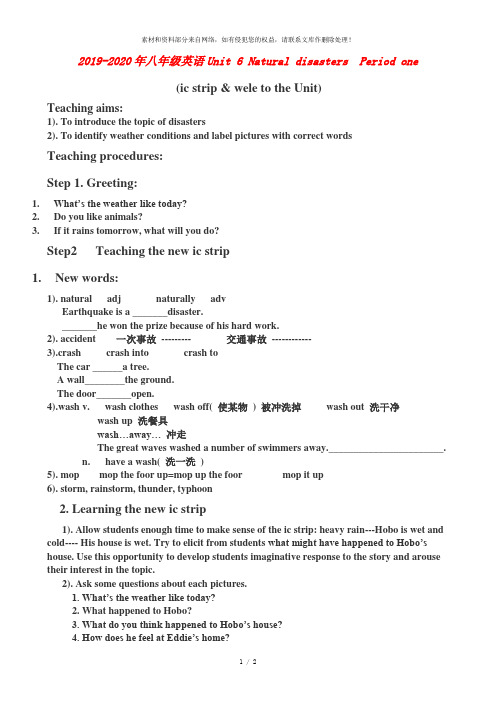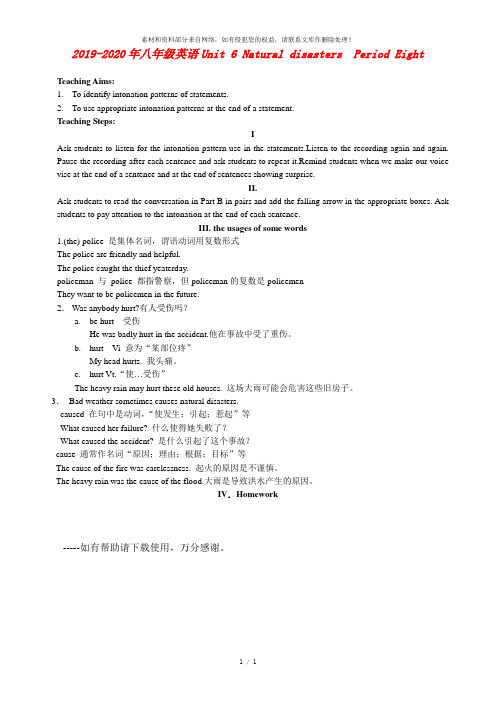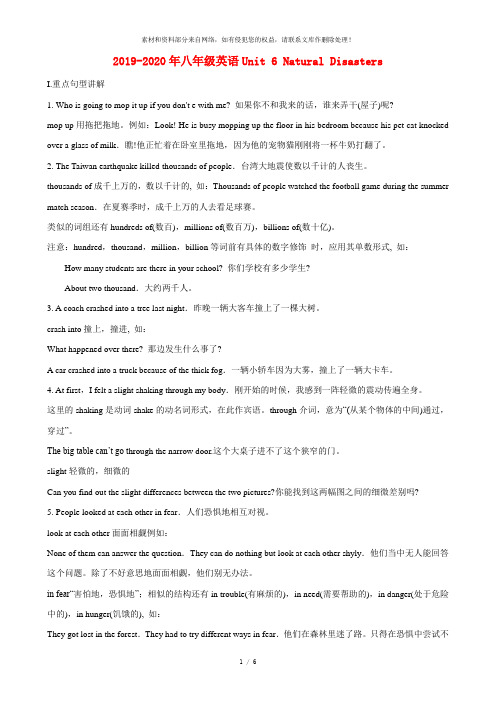2019-2020年八年级英语Unit 6 Natural Disasters(III)VOCABULARY
- 格式:doc
- 大小:1.17 MB
- 文档页数:10


2019-2020年八年级英语Unit 6 Natural disasters(VI)Teaching Aims:1. R ecognize key expressions involved in an emergency call.2. R evelop intensive listening skills by pleting an accident or disaster.3. T o describe an accident for disaster.Teaching Steps:I.GreetingII.PresentationExplain that Mr and Mrs Su had a car accident during the snow storm.Ask students to look at the two reports on page 100.Ask them to study the accident report in Part A,in pairs.III.ListeningAsk students to listen carefully to the conversation and plete the accident report form in part A,with as much information as they can.Q:1.What happened to the car?2.What was the weather like?3.When did it happen?4.What was wrong with Mr Sun? How about Mrs Sun?5.What did the policemen do?IV.PracticeStudents work on their own to plete Sandy’s e-mail,according to the information on page 100,then check it.V.Speak upAsk students in one of the groups to practise Sandy’s part and students in the other group Amy’s part.Then use this conversation as a model. Replace the underlined words with your own ideas.VI. Language points1. a ccidet :“事故”、“意外的事”(c.n.)have an accident 出意外have a little accident 出了一场小事故I had a little accident in the street last week.The accident happened on a cold morning in xx.---What happened to you last night? 昨晚你出了什么事?---I had an accident. 我出了点意外。

2019-2020年八年级英语Unit 6 Natural disasters Period one(ic strip & wele to the Unit)Teaching aims:1). To introduce the topic of disasters2). To identify weather conditions and label pictures with correct wordsTeaching procedures:Step 1. Greeting:1. What’s the weather like today?2. Do you like animals?3. If it rains tomorrow, what will you do?Step2 Teaching the new ic strip1. New words:1). natural adj naturally advEarthquake is a _______disaster._______he won the prize because of his hard work.2). accident 一次事故--------- 交通事故------------3).crash crash into crash toThe car ______a tree.A wall________the ground.The door_______open.4).wash v. wash clothes wash off( 使某物) 被冲洗掉wash out 洗干净wash up 洗餐具wash…away… 冲走The great waves washed a number of swimmers away._______________________.n. have a wash( 洗一洗)5). mop mop the foor up=mop up the foor mop it up6). storm, rainstorm, thunder, typhoon2. Learning the new ic strip1). Allow students enough time to make sense of the ic strip: heavy rain---Hobo is wet andcold---- His house is wet. Try to elicit from students what might have happened to Hobo’s house. Use this opportunity to develop students imaginative response to the story and arouse their interest in the topic.2). Ask some questions about each pictures.1. What’s the weather like today?2. What happened to Hobo?3. What do you think happened to Hobo’s house?4. How does he feel at Eddie’s home?1 / 25. Why doesn’t he want to go home alone?6. Will Eddie help him?Step 3. Language points:1. I know I shouldn’t stay here for too long but I can’t go home without you.Without I can’t do it _______your help.I went to school without ______ breakfast.2. Who’s going to mop it up if you don’t e with me?既然你把牛奶溅出来了,你就该把它擦干净Since you’ve spi lt the milk, you____________.2. The Taiwan earthquake killed thousands of people.kill one’s hope (使希望破灭)kill time (消磨时间)kill one’s hunger (充饥)thousands of 数以千计的two thousand我家的图书馆有数以千计的书和杂志。

素材和资料部分来自网络,如有侵犯您的权益,请联系文库作删除处理!2019-2020年八年级英语Unit 6 Natural disasters Period EightTeaching Aims:1.To identify intonation patterns of statements.2.To use appropriate intonation patterns at the end of a statement.Teaching Steps:IAsk students to listen for the intonation pattern use in the statements.Listen to the recording again and again. Pause the recording after each sentence and ask students to repeat it.Remind students when we make our voice vise at the end of a sentence and at the end of sentences showing surprise.II.Ask students to read the conversation in Part B in pairs and add the falling arrow in the appropriate boxes. Ask students to pay attention to the intonation at the end of each sentence.III. the usages of some words1.(the) police 是集体名词,谓语动词用复数形式The police are friendly and helpful.The police caught the thief yeaterday.policeman 与police 都指警察,但policeman的复数是policemenThey want to be policemen in the future.2.Was anybody hurt?有人受伤吗?a.be hurt 受伤He was badly hurt in the accident.他在事故中受了重伤。


2019-2020年八年级英语Unit 6 Natural DisastersI.重点句型讲解1. Who is going to mop it up if you don't e with me? 如果你不和我来的话,谁来弄干(屋子)呢?mop up用拖把拖地。
例如:Look! He is busy mopping up the floor in his bedroom because his pet cat knocked over a glass of milk.瞧!他正忙着在卧室里拖地,因为他的宠物猫刚刚将一杯牛奶打翻了。
2. The Taiwan earthquake killed thousands of people.台湾大地震使数以千计的人丧生。
thousands of成千上万的,数以千计的, 如:Thousands of people watched the football game during the summer match season.在夏赛季时,成千上万的人去看足球赛。
类似的词组还有hundreds of(数百),millions of(数百万),billions of(数十亿)。
注意:hundred,thousand,million,billion等词前有具体的数字修饰时,应用其单数形式, 如:---How many students are there in your school? 你们学校有多少学生?---About two thousand.大约两千人。
3. A coach crashed into a tree last night.昨晚一辆大客车撞上了一棵大树。
crash into撞上,撞进, 如:-What happened over there? 那边发生什么事了?A car crashed into a truck because of the thick fog.一辆小轿车因为大雾,撞上了一辆大卡车。
2019-2020年八年级英语Unit 6 Natural disasters 2 Teaching Aims:1. To infer meaning from keywords and context2. To sequence information to follow the gist of a storyTeaching Procedures:Step 1 Free talk:Talk about the weather. Review some words, such as: rainstorm,snowstorm, thunder and lightning, typhoon. Then bring the students to the reading step by step. Ask them to read the reading by themselves and try to answer the questions with their partners.1. Where was Timmy?2. What happened in the shopping centre?3. What happened to the buildings?4. How did people react?5. What did Timmy do?6. Where was Timmy when the shaking stopped?7. How did Timmy feel?Step2. Some important new words1. slight ( gentle or softly) (adj) slightly (adv.)I heard a_____whisper from upstairs.He waved his hands_____________.2. shake (v ) shaking ( n)Everything __________when an earthquake happens.I felt a slight ______through my body.3.direction ( n ) in all directions___________4.wild (adj ) wildly (adj) ----- 反义The wind blows my hair_______.5. calm ( adj )(not excited) 平静的(v.) 使平静,镇定calm down_____calm one’s down_____________At the news, he is quite still, but not____________.You must ___________when you make a decision.6. trap (n.) 陷阱set a trap_________The police _________for the bad eggs.v. 设陷阱捕捉,困住(trapped) be trapped________We __________in the fire.Step 3. Explain the languages points:1. At first, I felt a slight shaking through my body.through 1. 从头到尾,整个的。
2019-2020年八年级英语Unit 6 Natural Disasters(V)GRAMMAR II Teaching Objectives●To develop a better understanding of the use of past continuous tense●To understand the use of ‘when’ and ‘while’Teaching ProceduresSTEP 1 Reviewing the structure of past continuous tenseAsk the students what we learned yesterday to review the structure of past continuous tense.STEP 2 Finding sentencesRead the passage below; find how many sentences are written in this tense.STEP 3 Eliciting the structures with ‘when’ or ‘while’Raise some questions about this passage to elicit the structures with ‘when’ or ‘while’.What was the man in Flat doing when the robbery happened?While the college students in Flat 5 were watching a football game, what was the woman in Flat 2 doing?Write the structure on the board.It is still difficult for the students to understand the structure. So it is important to give them more examples to help them understand it.Get them to read the sentences in Part B, Page 101.STEP 4 Explaining when we shou ld use ‘while’ or ‘when’Give more examples and then explain when we should use ‘while’ or ‘when’.Emily was doing her homework while Stevenwas doing his project.两个长动作同时进行The light went out while Emily and Steven wereworking.一个短动作(主句)在一个长动作(从句)的过程中发生。
素材和资料部分来自网络,如有侵犯您的权益,请联系文库作删除处理!2019-2020年八年级英语Unit 6 Natural disasters(III)VocabularyTeaching aims:1. To identify words and phrases to describe weather conditions2. To use vocabulary to give weather forecastTeaching Procedures:Step1. Free talk:Write T or F1. Timmy was in a restaurant when the earthquake started.____2. Timmy heard a loud noise of thunder at first._____3. Animals ran wildly everywhere._______4. Timmy was trapped in a dark place when the earthquake stopped._____5. Timmy had nothing to eat when he was trapped under the bricks and stones.______6. People found Timmy at night._____Step2. Learn some new words about different kinds weather:sun-------sunny cloud-----cloudy wind---windyrain------rainy snow------snowy frost----frostyfog-------foggy storm-----stormyStep3. Exercises:1. The weather today is _____(sun) but it’ll be ______(cloud).2. It’ll be______(frost)on Sunday.3. The temperature is going to drop a little. It’ll be_____(snow).4. Now it ________(rain). It’s______(rain).5. Today is a____(rain)day. It _______hard.6. 明天天气更遭。
2019-2020年八年级英语Unit 6 Natural Disasters(III)VOCABULARY Teaching Objectives●To learn to talk about and describe the weather●To identify the vocabulary about different kind of weather conditions●To understand the weather report from TV or radio●To have a better understanding of the topic of the unitTeaching ProceduresSTEP 1 Looking and learningShow some pictures of different kinds of weather condition. Then get them to elicit the noun and adjectives and write them of the board in pairs.Try to use sentences to talk about the weather. Do not just write the words down. e.g. There is white snow everywhere. It is snowing. It is a snowy day.Explain how a noun is changed into an adjective. We add a ‘-y’ to most of the nouns to make adjectives. Point out that we need to double the ‘n’, when we are changing ‘sun’ into an adjective.STEP 2 pleting the exercises in Part AInvite the students to plete the exercises in Part A, Page 94. And then get the students to read the words well. STEP 3 Using words in contextShow more pictures and offer the students a chance to use these words, as the pictures are shown in thefollowing table.Get the students to talk about the pictures and help them to understand the use of nouns and adjectives on weather conditions.STEP 4 Eliciting the weather forecast/ weather reportUse some pictures to elicit the weather forecast/ weather report. They get the students to learn about the symbols of weather conditions.Get the students to read the words and then invite them to do Part B, Page 98.First get the students to check the answers in pairs and then check it in class. Go through the dialogue and then help the students to understand the changes to the weather with the help of the table above. Get the students to read the dialogue together. Make sure that the students can read the temperature well. STEP 5 Giving a weather reportShow the students the local weather conditions and ask them to give a weather report using the given information. For stronger classes the teacher can download some maps of weather and get the students to talk about it. Give them some sentence structures.1.The weather was /is/will be…,but it will be/get…2.The weather will get better/worse.3.The high temperature is …4.The temperature is around….It is going to drop to…STEP 6 Homeworka. Watch the weather forecast programme on TV . And then write a report about it in English. Encouragethe students to listen to the weather report on CCTV 9.b.Finish off the exercise in the Evaluation Handbook and Learning English.c.d.e.2019-2020年八年级英语上册Unit2Howoftendoyouexercise(第1课时)Newwordsandphrases教案新人教版Teaching and Learning Goals:一、语言知识和语言功能:1.能争取学会使用下列词汇造句子(Curriculum words)housework, Internet, program, swing, coffee, health, result, percent, television, mind, body, writer, dentist, online, such, hardly, ever, once, twice, maybe, least,together, however, almost, less, although, than, through2. 能争取学会使用下列常用短语和句子(Useful expressions)hardly ever, swing dance, at least, junk food, such as, more than, less than 3.能就经常进行的活动这一话题进行问答交流,正确表达自己的情感。
4. Understand, translate and retell a passage made up of the above Curriculum words and phrases according to a mind map (理解、翻译并复述用本单元单词短语编写的故事。
)二、学习策略1. 通过观察比较发现规律,掌握新单词的发音和拼写2. 学会在语境中记忆单词三、情感目标:1.了解中西方中学生常进行的活动。
2.了解一些健康小常识。
Teaching and Learning Steps:Step 1. Try to read the words.1.Students try to read the words using the phonetics by themselves and underlinethe words they can’t read.2.Ask students to read the word together and then read aloud freely.3.Read after the tape and pay attention to the pronunciation.4.Students read the words with their partners in groups and talk about the difficultwords.5.Get some individual students to read the words and ask other students to correctthe pronunciation.(设计意图:八年级应该继续培养学生根据音标学习单词的能力,形成自主学习的习惯。
先让学生自己根据音标认读单词,把不会的标出来,然后再跟录音机读, 反复几遍,让学生注意一些难单词的发音然后通过同位或小组对难单词进行讨论,进行组内互帮互助解决。
然后让不同层次的个别学生起来读,便于老师掌握学生的读单词情况。
老师只在关键时刻进行指导点拨,真正做到以学生为主体教师为主导。
)Step 2. Learn to remember the new words .一. Learn the words by looking at the pictures.exercise (锻炼)The students exercise every day at school .housework (家务)The children help her mother with housework .Internet (互联网)Most young people like using the Internet.television program (电视,节目)What television program do you like best?4.coffee(咖啡)I don ’t like drinking coffee.junk food (垃圾食品)We shouldn't eat too much junk fooddentist(牙科医生)I want to be a dentist .二.Learn the words by using them.always usuallyoftensometimes hardly ever never1. Always means one hundred percent .2. She eats fruits once (一次) a month. she hardly ever eats fruit.3. My father exercises twice (两次)a week. He sometimes exercises once a week.三.Learn the phase by matching itself with its meaning. 1. hardly ever 摇摆舞 2. at least 少于3. swing dance 几乎从不4. junk food 垃圾食品5. more than 至少,不少于,6. less than 多于三:Remember the words by their similar pronunciation and forms.1. [i] sing wing king swing2. [ai] kind mind rice twice3.[∧] but must such result4. [e] never ever Internet less5. [∧] one won once none四:Remember the words by conversion( 转换),plex words( 合成词) and derivative( 派生词 ).1.转换:Would you mind exercising with me? Exercise is healthy for the mind and the body.2.合成:housework家务劳动 house(房子)+ work(工作)online 在线的,联网的 on(在…上的)+line(线)however 然而,不过 how(怎样)+ever(以前,曾经)maybe 大概,可能 may(可能,也许)+be(作助动词)3. 派生:hardly 几乎不,几乎没有:hard + lyalthough 虽然,即使,尽管:al + thoughwriter 作家,作者: write + ralmost 几乎,差不多: al + most五.Remember the words by their Chinese.1. 一次__________2. 两次__________3.结果__________4. 这样的,那样的_____________5. 没有一个,毫无___________6. 比___________ (设计意图:让学生通过图片根据实际应用来学习单词,并在句子中呈现,形象直观,简单易懂,也能激发学生的学习兴趣。